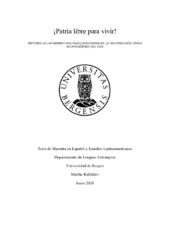| dc.contributor.author | Kalleklev, Marthe | |
| dc.date.accessioned | 2020-07-02T04:21:55Z | |
| dc.date.available | 2020-07-02T04:21:55Z | |
| dc.date.issued | 2020-07-02 | |
| dc.date.submitted | 2020-07-01T22:00:40Z | |
| dc.identifier.uri | https://hdl.handle.net/1956/23193 | |
| dc.description.abstract | Esta tesis de maestría es un estudio del movimiento de oposición actual en Nicaragua que comenzó con protestas pacíficas masivas contra las reformas de seguridad social anunciadas por el presidente Daniel Ortega en abril de 2018. Cuando el gobierno reaccionó con violencia y represión, los manifestantes respondieron con consignas revolucionarias y levantando barricadas, haciéndose eco del repertorio utilizado por Ortega y los sandinistas durante la insurrección y la revolución en los años setenta. Este estudio examina en el tipo de repertorio que utiliza la oposición en relación con la retórica y las estrategias desarrolladas por el movimiento sandinista durante la década de 1970, sugiriendo que la oposición no solo exige democracia, libertad y justicia, sino también reivindica la historia nacional y la memoria colectiva del pasado revolucionario. A través de una investigación histórica cualitativa, con un enfoque en entrevistas en profundidad con las historias de vida de participantes que han formado parte de ambos movimientos, la revolución de 1979 y el levantamiento de 2018, esta tesis analiza la transición de la narrativa revolucionaria en las expresiones de la oposición actual a Ortega en Nicaragua. El estudio encuadra en la categoría de historia del presente, utilizando testimonios orales como la fuente principal para estudiar un proceso histórico que conduce a la actualidad. El objetivo de esta investigación es analizar la transición de la narrativa y el repertorio sandinista de los años setenta al actual movimiento de oposición, en relación con procesos de legitimación política, a través de una reconstrucción histórica y los testimonios orales que captan la memoria y las experiencias de los nicaragüenses quienes han vivido estos dos momentos de contención política en Nicaragua. La investigación muestra tanto continuidades como rupturas con la narrativa revolucionaria, siendo la ruptura más significativa la decisión de liderar un movimiento pacífico de oposición contra el régimen de Ortega, influenciado por las experiencias de guerra de la generación mayor, en contraste con la revolución armada liderada por los sandinistas en 1979. Fundada en esto, las futuras investigaciones podrían concentrarse en la generación más joven y su cultura política y repertorio, ya que ellos lideraron la revuelta en 2018, utilizando el repertorio de la revolución sin haberlo vivido ellos mismos. | en_US |
| dc.description.abstract | This Master thesis is a study of the current opposition movement in Nicaragua that started with massive peaceful protests against the social security reforms announced by President Daniel Ortega in April 2018. As the government reacted with violence, the protesters responded with revolutionary slogans and building barricades, echoing the repertoire used by Ortega and the Sandinistas during the insurrection and revolution in the 1970s. This study focuses on the kind of repertoire the opposition use in connection with the rhetoric and strategies developed by the Sandinista movement during the 1970s, suggesting that the opposition is not only demanding democracy, freedom and justice, but also claiming the national history and collective memory of the revolutionary past. Through a qualitative historical investigation, with a focus on in-depth interviews with the life stories of participants who have formed part of both movements, the revolution of 1979 and the uprising of 2018, this thesis looks at the transition of the revolutionary narrative in the expressions of the present opposition to Ortega in Nicaragua. The study falls under the category of present history, using oral testimonies as the primary source to study a historical process that leads up to the present time. The aim of this research is to analyze the transition of the Sandinista narrative and repertoire from the 70s to the current opposition movement, in connection with the process of political legitimacy, though an historical reconstruction and the oral testimonies that captures the memory and experiences of Nicaraguans who have lived through these two moments of political contention in Nicaragua. The investigation shows both continuations and ruptures with the revolutionary narrative, the most significant rupture being the decision to lead a peaceful opposition movement against the Ortega regime, influenced by the experiences of war of the older generation, in contrast to the armed revolution led by the Sandinistas in 1979. Founded on this, future investigations could concentrate on the younger generation and their political culture and repertoire, as they led the uprising in 2018, using repertoire from the revolution without having lived it themselves. | en_US |
| dc.language.iso | spa | |
| dc.publisher | The University of Bergen | |
| dc.rights | Copyright the Author. All rights reserved | |
| dc.title | ¡Patria libre para vivir! Historia de las narrativas revolucionarias en la insurrección cívica nicaragüense del 2018 | |
| dc.title.alternative | ¡Patria libre para vivir! History of the revolutionary narratives in the Nicaraguan civic insurrection of 2018 | |
| dc.type | Master thesis | |
| dc.date.updated | 2020-07-01T22:00:40Z | |
| dc.rights.holder | Copyright the Author. All rights reserved | |
| dc.description.degree | Mastergradsoppgave i spansk og latinamerikastudier | |
| dc.description.localcode | MAHF-SPLA | |
| dc.description.localcode | MAHF-LÆFR | |
| dc.description.localcode | SPLA350 | |
| dc.subject.nus | 711128 | |
| fs.subjectcode | SPLA350 | |
| fs.unitcode | 11-20-0 | |
